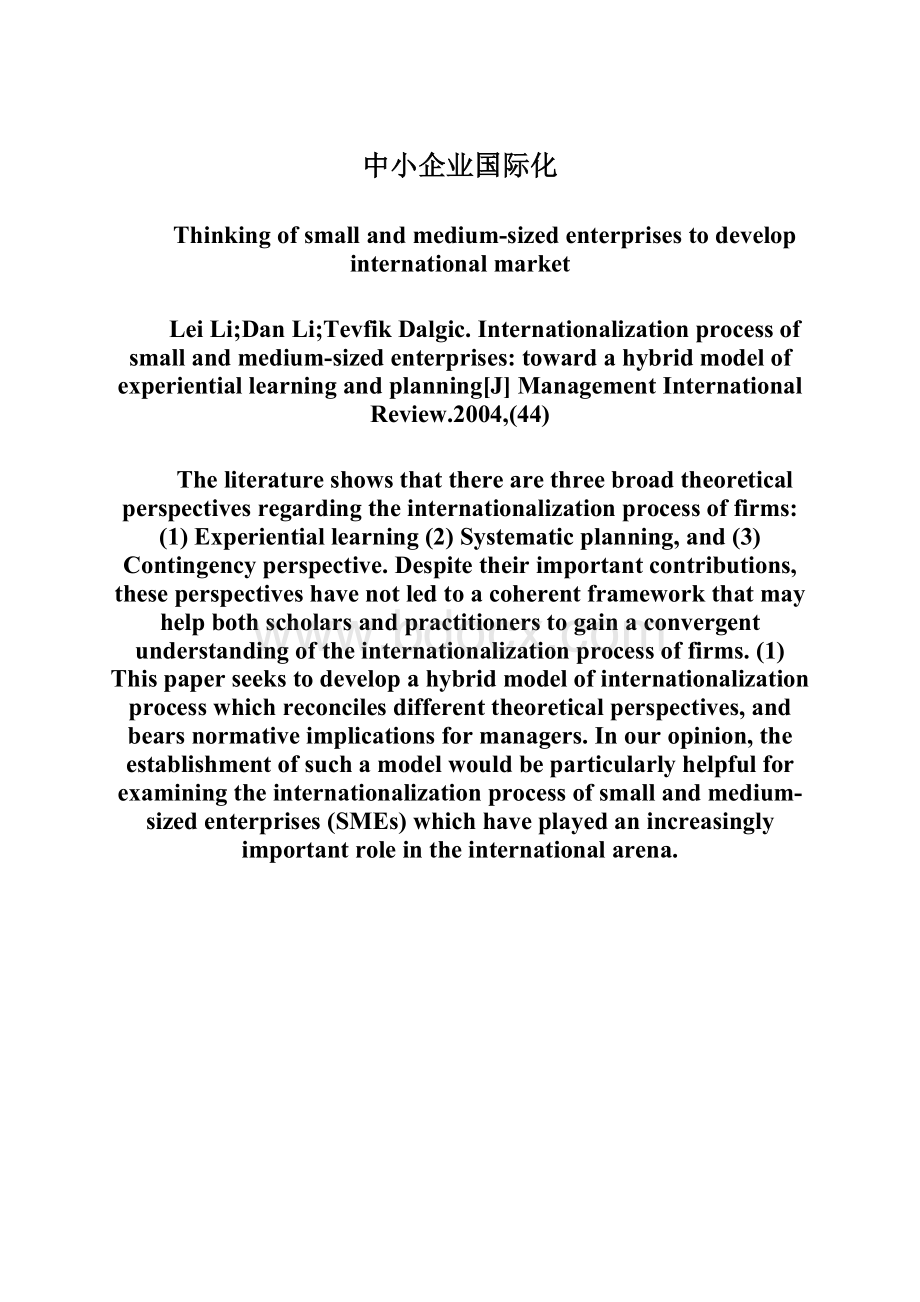中小企业国际化.docx
《中小企业国际化.docx》由会员分享,可在线阅读,更多相关《中小企业国际化.docx(15页珍藏版)》请在冰豆网上搜索。

中小企业国际化
Thinkingofsmallandmedium-sizedenterprisestodevelopinternationalmarket
LeiLi;DanLi;TevfikDalgic.Internationalizationprocessofsmallandmedium-sizedenterprises:
towardahybridmodelofexperientiallearningandplanning[J]ManagementInternationalReview.2004,(44)
Theliteratureshowsthattherearethreebroadtheoreticalperspectivesregardingtheinternationalizationprocessoffirms:
(1)Experientiallearning
(2)Systematicplanning,and(3)Contingencyperspective.Despitetheirimportantcontributions,theseperspectiveshavenotledtoacoherentframeworkthatmayhelpbothscholarsandpractitionerstogainaconvergentunderstandingoftheinternationalizationprocessoffirms.
(1)Thispaperseekstodevelopahybridmodelofinternationalizationprocesswhichreconcilesdifferenttheoreticalperspectives,andbearsnormativeimplicationsformanagers.Inouropinion,theestablishmentofsuchamodelwouldbeparticularlyhelpfulforexaminingtheinternationalizationprocessofsmallandmedium-sizedenterprises(SMEs)whichhaveplayedanincreasinglyimportantroleintheinternationalarena.
(2)Therearethreemajorreasons.First,SMEsusuallyhavelimitedresourcestoallocateforinformationandknowledgeacquisitionpertainingtoforeignmarkets.Theycannotaffordtoundertakeathoroughsystematicplanningprocessasbigfirms.Second,SMEsareinternationallyinexperiencedcomparedtolargemultinationalenterprises(MNEs).Theyfacetheproblemof"unknownunknowns".Third,today'sSMEsinitiatetheirinternationalexpansioninaglobalenvironmentwhichissubstantiallydifferentthantheonefacedbytraditionalMNEstwoorthreedecadesago.Theyoftenhavetorespondtointernationalmarketopportunitiesinaverytimelymanner.
Ingeneral,thesystematicplanningmodelsseemtobeextremelyrational.First,thecentralassumptionofthesemodelsistheviabilityofthoroughandefficientmarketinformationcollectionandanalyses.However,consideringtherecenttrendofquickenedandearlyinternationalizationofSMEsinthepresenceofevadingmarketopportunitiesandturbulentbusinessenvironments(UNCTAD1993,OECD1997),thevalueoflengthyplanningisincreasinglyquestionable.
Second,fromthebehavioralperspectiveofcorporatedecision-making,manydecisionsmaybemadesimultaneouslyratherthansequentially.Therefore,someoftheproposedsequentialstagesmaynotbedistinguishableincertaincontexts.Third,afirm'sinternationalizationprocessmaybesignificantlyaffectedbyitsmotivationsandinitialcompetencies.
Thesystematicplanningschoolistoo"rational"toincorporatetheneedforexperientiallearning.However,itisclearlycomplementarytothelatter.Ourfundamentalpointisthatexperientiallearningandsystematicplanningaretwoseparatebutsemi-sequentiallyinterrelatedcomponentsintheinternationalizationprocessoffirms.Neglectofeitherwouldbemisleadingtheoreticallyandharmfulinpractice.
Discussions
Thisstudyshowsthateachofthereceivedperspectivesonfirms'internationalizationprocesses,ifitstandsalone,hasafarmorelimitedutilitytopractitionersaswellasresearchers.Wepresentahybridmodelthatnotonlyintegratesexperientiallearningandsystematicplanning,butalsoincorporatesthemorerecentcontingencyperspective.Suchamodelisintendedtohelpbothresearchersandpractitionersinreviewingandanalyzinginternationalizationprocessstrategiesoffirmsfromaholisticperspective.Itshouldbenotedthatalthoughourmodelsharesacentralcontentionwiththecontingencyperspective,itdiffersinsomeimportantaspects.First,weemphasizethatanintegrationofexperientiallearningandsystematicplanningcanprovideamorebalancedviewoftheinternationalizationprocess.Itisnotthattheyarewrong;theyeachonlytellapartialtruth.Combinedtogetherinasemi-sequentialmanner,theycanhaveamuchstrongerexplanatorypower.Second,althoughweagreethatfirms'internationalizationprocessesareessentiallypathdependentandhighlyunpredictable,wecontendthatamodelorframeworkcanbegeneratedtocapturethevarietyofseeminglychaoticandnon-rationalpatterns.Third,wesuggestthatsuchamodelbearsnotonlydescriptivebutalsostrongnormativeimplications..
OurmodelmaybeofparticularrelevancetoSMEs.First,mostlargeMNEshavealreadypassedtheearlystageofinternationalization.Theirfocushasshiftedtothetaskssuchasincreasinghostcountrymarketshares,reconfiguringvalue-addedprocesses,improvingefficiency,andenhancingglobalintra-firmlearningratherthanforeignmarketentries.Thus,ourmodelmaynotbeasessentialtolargeMNEsastoSMEs.
Second,evenwhenlargeMNEsneedtoenternewforeignmarkets,theyusuallyhavethecapacities,routinesandinternationalexperiencetogothroughasystematicplanningprocess.Thisprocessisoftencostlyandtime-consumingbutcouldbeworthwhileconsideringthetypicallylargesizeoftheirforeigninvestments.Incontrast,SMEsneedtobefocusedandflexiblegiventheirrelativepaucityofresources(e.g.,managementtime,Planningstaff,money,etc.)andinternationalexperience.Attimes,aSMEwouldbenefitfromundertakingasystematicplanningprocessifithasaclearedgeintechnologyandproductquality,andhasdiscretiontopickanappropriateforeignmarkettostartitsinternationalcampaign.Othertimes,aSMEmayonlyneedtofocusonacriticalstepintheplanningprocesssuchasthenegotiationandevaluationofentrymode.if,forexample,itmustfollowakeycustomerabroadtoretainthebusiness.Onoccasions,itwouldbewiseforaSMEto"muddlethrough"withincrementalstepswithoutavisibleplanningphaseif,forexample,thefirmisinvolvedinavolatileanduncertainindustry,andhastotakeactionstogainvaluableindustryandmarket-specificinformation,andexploreitsstrategicoptions.Inshort,ourmodeltendstoappealtoSMEsbetterbecauseitcaterstoawiderangeofinternationalizationprocesses.OurmodelbearssomespecificnormativeimplicationsforSMEmanagers.
(1)OurhybridmodelmayserveasaroadmapforSMEs.AlthoughsystematicplanningisoftennotpracticalforSMEs,ad-hocactionsarenotdesirableforthemeither.SMEmanagersmayuseourmodeltopreparefortheirintendedinternationalizationprocessstrategies.Theyshouldfirstexaminetheirmotivationsandexistingcompetencebasecarefully.Then,theyneedtoidentifyandfocusonthecriticalstepsintheinternationalizationprocessanddeploytheirlimitedresourcesaccordingly.Forexample,anindustrialsupplierfollowingitsmajorcustomerabroadmaywanttospecificallystudythesuppliers'marketinthehostcountryandthefeasibilityofformingajointventurewithitscustomerasJapanesecompanieshavepracticed.
(2)SMEs'internationalexpansionisoftentriggeredbyexternalad-hocsignalssuchastheactivitiesofcustomers,suppliers,orpartners.Moreover,SMEsarenotmuchfetteredbybureaucracyandhierarchicalthinking.Topmanagers'personalinitiativescanoftendriveinternationalizationatanacceleratedpace,especiallyforinnovation-orientedSMEs.Comparedtoexperientiallearningandsystematicplanningmodels,ourhybridmodelisrelativelyflexibleinthesensethattheprocessisneitherpredeterminednorlinearlysequential.Thus,itmayassistSMEmanagersinweighingonemergentinternationalizationprocessesand/ormakingsenseoutofcompetitors'internationalizationstrategies.
(3)Ourmodelshowsthatafirm'sinternationalizationprocessisiterative.Eachphase(e.g.,antecedents)receivesperiodicfeedbacksfromitssubsequentphases(e.g.,planningandexecution).SMEmanagersfacedifferentoptionsandconstraintsfromoneiterativeprocesstoanother.OurmodelhasapotentialtohelpSMEmanagerstoidentifysensiblepathsineachiterativeprocesstoavoidseriousblundersorwastedefforts.
Ourmodelalsobearsafewimplicationsforfutureresearch.First,itmayserveasaplatformbasedonwhichresearcherscanconceiveandbuildmoresophisticatedinternationalizationprocessmodels.Forexample,wehaveonlyspecifiedtwoantecedentsofinternationalization:
Motivationandcorporatecompetence.Thereisplentyofroomforinformedscholarstodefineanddeveloptheantecedentphasemoresystematically.Moreover,ourmodelleavesoutenvironmentalfactorssuchasindustrialcharacteristicsandhome/hostcountryeffectsthatcanbesalientforSMEs.Itwouldbeinterestingtoseehowthebusinessenvironmentmaybeexplicitlyincorporatedintoourhybridmodel.
Second,scholarsmayidentifymanyspecificempiricalresearchissuesfromourmodel.Forexample,onemayexaminehowthedisparityofmotivationsandcorporatecompetenciesmayleadtodivergentinternationalizationprocessesforSMEs.Althoughmotivationandcompetencehavebeenaddressedextensivelyinforeigndirectinvestment(FDI)literature,theyaremuchmoreoftenreferredtoinconnectionwithFDIdirection,location,andentrymodethanwithinternationalizationprocesses.Onemayraisespecificallysuchunansweredquestions:
(1)Givenacertainmotivation(e.g.,marketseeking,customerfollowing,ortechnology/resourcesacquiring),howmightaSME'scompetencelevelaffectitschoicebetweenexperientiallearningandsystematicplanningaswellasitsdegreeofcommitmentintheexecutionphase?
(2)Givenacertainlevelofcompetence,howwouldSMEswithvariousmotivationsselectdifferentinternationalizationprocesses?
Third,asnotedearlier,today'sSMEsfaceaglobalbusinessenvironmentvastlydifferentfromtheoneinwhichtraditionalMNEswereinitiallyinvolved.Yet,weknowlittlespecificsre